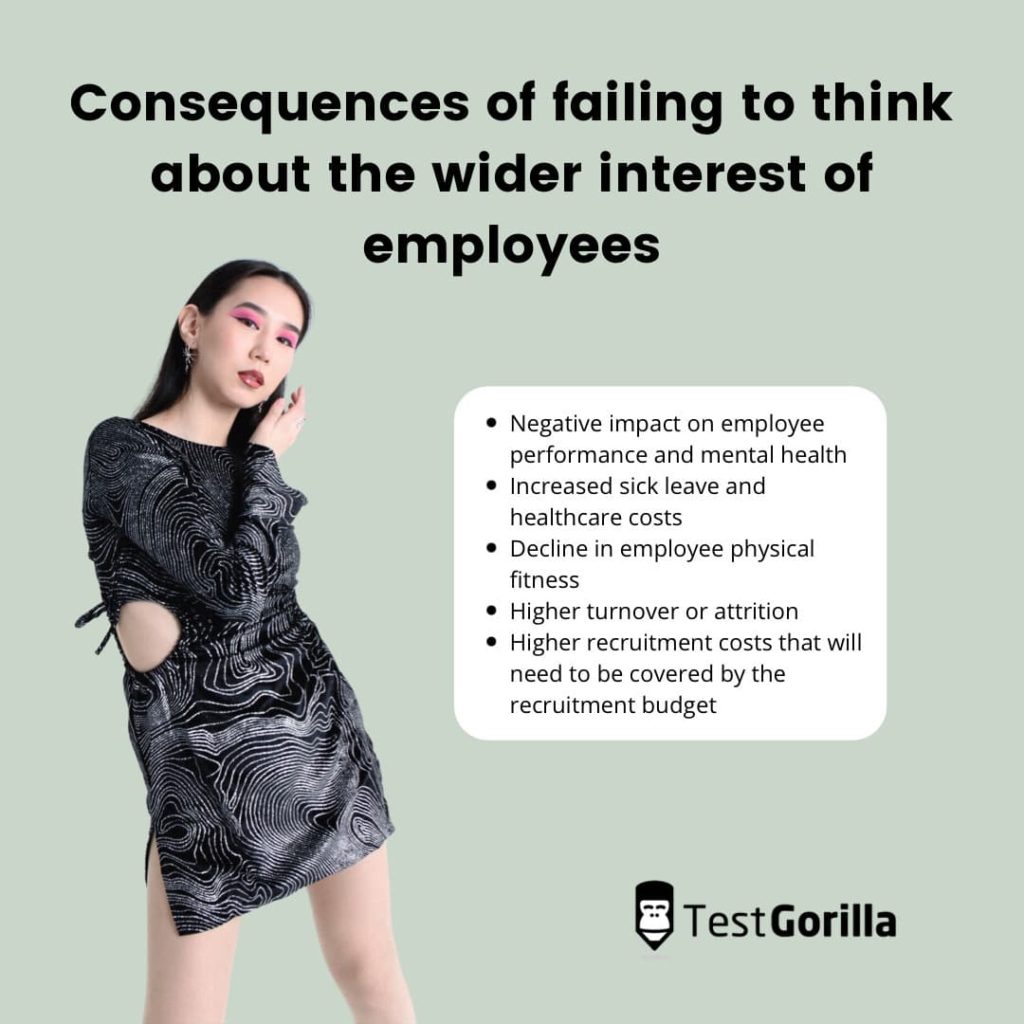Are you looking for ways to reduce employee turnover and sick leave in your organization?
Or maybe you are considering ways to increase productivity within your team to start achieving targets more easily?
Holistic HR is precisely what your organization needs to achieve these. You, your primary stakeholders, and your team will benefit from it greatly.
This article will show you the most important elements of holistic HR, why you should use it, and how skills testing makes it easier to implement this strategy.
Table of contents
- What is holistic HR?
- Shifts towards holistic approaches in HR: How has HR changed?
- Why should business organizations use a holistic HR strategy?
- Putting the HR department under the microscope: How to implement holistic HR?
- What are the challenges of implementing a holistic HR strategy?
- How do holistic HR strategies help to prevent unconscious bias?
- How can skills testing help you develop a holistic HR strategy?
- What are the benefits of holistic HR strategies?
- Implement a holistic HR strategy with ease with a skills testing platform
What is holistic HR?
The first step of a successful holistic HR strategy is to look at the larger picture when engaging with employees, including their life goals outside the organization’s internal environment.
The strategic objectives of your HR team should aim to support your employees’ ambitions, ensuring they can perform at the optimum level. Implement the following steps once they’re approved by human resource management.
Shifts towards holistic approaches in HR: How has HR changed?
A notable shift towards holistic HR approaches first occurred in the 1980s. Compared with the traditional approach, important stakeholders now ask for greater corporate social responsibility. As part of this, managers’ expectations now include respecting the interests and managing the relationships of all internal and external stakeholders.
The new approach to holistic HR at the organizational level uses a strategic perspective, in which employers are increasingly acknowledging their employees’ different values.
Why should business organizations use a holistic HR strategy?
Different human resource management teams use unique approaches to implement a holistic HR strategy for various reasons.
Holistic HR can have a considerable influence on businesses, allowing HR professionals to avoid the consequences of failing to think about the wider interests of their employees. These consequences include:
A negative impact on employee performance and mental health
Increased sick leave and healthcare costs
A decline in employee physical fitness
Higher turnover or attrition
Higher recruitment costs that will need to be covered by the recruitment budget
Holistic HR helps to prevent all these. A business’s sustainable future and its economic value depends on sustainable relationships with all the relevant stakeholders brought about by an effective management strategy and holistic HR.
Also, remember the two other critical reasons why your business needs a holistic HR strategy:
Employees increasingly seek a flexible and meaningful work-life balance that will have a positive impact on their lives both at home and at work.
Negative HR outcomes include high turnover rates and the challenge of filling vacant positions due to high attrition. They happen in teams that don’t nurture employees or use holistic HR.
Putting the HR department under the microscope: How to implement holistic HR?
Implementing holistic HR strategies isn’t simple, but it begins with examining the role of the human resources team within the larger organization.
Holistic HR entails building trust and loyalty and promoting employee safety and wellbeing.
Since the overall purpose of HR processes and daily operations are about assisting the teams and people within a business, you should consider your HR department a critical part of the entire organization.
Holistic hiring: Which questions should you ask?
You might first analyze the skills and competencies of your candidates with a skills testing platform. But you’ll also need to look at various criteria to assess your applicants in order to encourage a culture that focuses on employee experience, which is particularly important for retention.
As part of your holistic hiring approach, think about the following questions and ask your candidates questions related to them:
How have your candidates and employees achieved their successes?
What steps have they taken to overcome a difficulty at work?
What are the different skills that help them achieve success?
Once you’ve recruited, think about the following questions (which you might even ask your employees directly):
How do your employees achieve a work-life balance?
Do your employees have any personal life goals that they’d like to achieve?
Do they have children or a family that they need to provide for?
Using data and tweaking the strategy: What are the next steps?
Your second objective should be to use the data you’ve received from your employees’ responses to hire candidates. You can then help your employees maintain their work-life balance as well as achieve their work goals by using a coherent approach when developing training opportunities. Skills testing can help with this.
As a final step, you’ll also need to review your employees’ compensation, make sure you are offering a competitive sum, and think about the benefits/perks of your organization.
Keep in mind that your strategy should be tweaked and adjusted, as holistic HR is an ongoing process that takes time to build. Your goal should be to develop your organization’s activities that foster the wellbeing, steady growth, and high performance of your employees.
What are the challenges of implementing a holistic HR strategy?
Take note of the three challenges you’ll encounter when implementing a holistic HR strategy, which include not having the right techniques, not using the right tools, and minimizing unconscious bias.
Which techniques do you need to execute a holistic HR strategy?
Use blind resume screening as part of your holistic hiring strategy. This technique involves removing candidates’ personal details (i.e., the name, photo, and address) from resumes during the applicant screening stage, which helps recruiters avoid unconscious biases when hiring.
But you may notice the paradox relating to the holistic model of HR here: If you remove a candidate’s details from the record, you limit the personal data you have on your applicants and therefore how much knowledge you have about your candidates’ lives as a whole.
One answer to this paradox is to proceed with a blind resume screening technique, but learn more about your candidates as they advance through the hiring process in interviews. It’s important here to create an inclusive environment so employees feel comfortable talking about their lives.
Which tools do you need to implement a holistic HR strategy?
You’ll need certain tools to help you implement a holistic human resource management model and help your employees thrive in the workplace.
Skills testing tools
Skills testing tools will help you implement a holistic HR strategy in your organization. Use these tools to spot the weaker skills of your employees.
Blind resume tools
New technologies such as the Blendoor tool can help you with the blind resume screening technique. It blurs the personal details on your candidates’ resumes to ensure your hiring decisions aren’t affected by unconscious bias.
How do holistic HR strategies help to prevent unconscious bias?
While unconscious bias hinders holistic HR strategies, successfully transitioning to becoming a holistic organization can itself prevent unconscious bias by foregrounding inclusion and belonging.
Although all human beings have it, unconscious bias can prevent HR teams and hiring managers from making sound decisions related to career progression, efficient talent management, or talent evaluation.
Holistic strategies help HR teams to recognize employees’ talents by using a multi-dimensional concept of performance within the larger picture. Remaining aware of the different areas of your employees’ performances helps you make training decisions to assist employees in achieving their specific goals.
They also prevent hiring managers from making biased evaluations by promoting an inclusive culture that enables greater awareness of potential biases. This, in turn, supports the progressive career development of your employees, while the economic progress of the business increases due to improved employee productivity.
How can skills testing help you develop a holistic HR strategy?
Developing the right training, upskilling, and reskilling opportunities for your employees to help them reach a higher level in the organization is challenging, but using skills testing as part of a holistic HR strategy will make this easier.
A skills testing platform is an essential resource that helps you evaluate the current level of your employees (and candidates). Use them as a point of reference against which you can set the content for training sessions. The results of a skills assessment give you:
Quantitative and qualitative data on your employees’ cultural alignment with the organization
Measures of performance like hard and soft skills
Predictive statistics that help ensure bias-free decisions for promotions based on key competencies
Benchmarks that motivate employees and contribute to employee engagement, helping them to achieve a high performance level
What are the benefits of holistic HR strategies?
Two key benefits of using a holistic HR policy include cost-effectiveness of recruitment through budget savings and increased labor productivity.
How does holistic HR lead to cost-effectiveness and recruitment budget savings?
As motivation will be a crucial part of your strategy, you’ll be fostering your employees’ development and investing in them while encouraging them to remain with your organization. And since your turnover and attrition rates will be lower with a holistic HR strategy, you’ll save on recruitment costs by enhancing your existing employees’ experiences and nurturing them.
How does holistic HR lead to an increase in labor productivity?
Since holistic HR focuses on nurturing a more content workforce, this strategy is key to showing that your employees are valued. Employees satisfied with their roles and accepted as valuable assets to the organization are 12% more productive.
Implement a holistic HR strategy with ease with a skills testing platform
Acknowledging your employees’ competencies and helping them achieve their personal and professional goals can be a challenge, but you’ll achieve them with skills testing.
Skills tests will show you your employees’ strengths, which are vital to excel in the workplace and their home lives.
And remember to do the following to implement your strategy successfully:
Remain aware of unconscious bias when hiring
Hire diverse teams
Build an inclusive environment
Use blind resume screening tools
Ask the right questions
These steps will make implementing a holistic HR strategy effortless.
With TestGorilla, you’ll find the recruitment process to be simpler, faster, and much more effective. Get started for free today and start making better hiring decisions, faster and bias-free.
Related posts
Hire the best candidates with TestGorilla
Create pre-employment assessments in minutes to screen candidates, save time, and hire the best talent.
Latest posts
The best advice in pre-employment testing, in your inbox.
No spam. Unsubscribe at any time.

Hire the best. No bias. No stress.
Our screening tests identify the best candidates and make your hiring decisions faster, easier, and bias-free.
Free resources
This checklist covers key features you should look for when choosing a skills testing platform
This resource will help you develop an onboarding checklist for new hires.
How to assess your candidates' attention to detail.
Learn how to get human resources certified through HRCI or SHRM.
Learn how you can improve the level of talent at your company.
Learn how CapitalT reduced hiring bias with online skills assessments.
Learn how to make the resume process more efficient and more effective.
Improve your hiring strategy with these 7 critical recruitment metrics.
Learn how Sukhi decreased time spent reviewing resumes by 83%!
Hire more efficiently with these hacks that 99% of recruiters aren't using.
Make a business case for diversity and inclusion initiatives with this data.




















